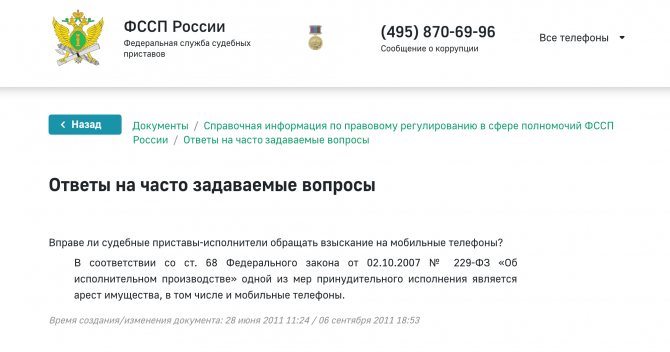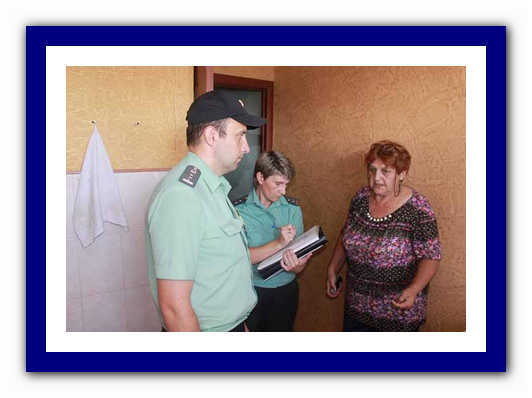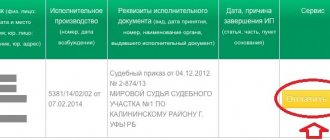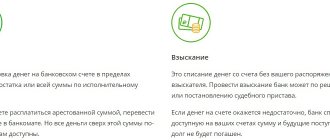In case of non-payment of debts, the state may take measures called seizure of property.
This procedure literally ensures full repayment of the debt by seizing the debtor's property.
Bailiffs do not confiscate all of the debtor’s material “wealth,” but only part of it to fully repay the debt.
How is it appealed and released from compulsory payment measures?
Law
The Federal Law of the Russian Federation regulates every action of bailiffs in the process of seizure of property. According to Article 80 of the Federal Law, a bailiff may, out of turn to collect the debtor’s property, seize his property.
The procedure is carried out according to a special executive document, which contains a clear requirement for recovery. It can be used in the execution of a judicial act on the confiscation of the debtor’s property and in the seizure of his property, as well as to ensure complete safety for its transfer to the claimant.
The fact of seizure means a ban on its use and disposal. The period is determined by the bailiff depending on its value and significance for the owner.
Inventory
The bailiffs draw up an act in which it is necessary to indicate: The process must be carried out in the presence of witnesses and the debtor himself.
- Last names, first names and patronymics of people present during the procedure;
- The duration of restrictions on the owner’s right to use the seized property, as well as the scope and type of restrictions;
- Distinctive features and full name;
- Full name and address of the person to whom the property is transferred for storage;
- Written statements from witnesses;
- Seizure mark;
- Confirmation that the debtor has been told his rights and obligations.
At the time of the inventory, the debtor's securities and money may be seized. An inventory of the debtor's property during arrest is drawn up by witnesses and bailiffs. Copies of the document can be transferred to the bank, persons present at the arrest and other interested persons.
What specific property is not subject to seizure by Russian bailiffs?
The bailiff determines the exact time at his own discretion, but listens to the opinion of the debtor and the collector: it is important for the bailiff to find the debtor at home, and not wait at the door for him to return from work.
The debtor has the right to choose the property to be transferred to the bailiff if the debt is repaid with this property, but the final word belongs to the bailiff.

“The phone can be taken away,” the bailiffs answer on the website of the FSSP of the Russian Federation
They do not take away things necessary to meet minimal household needs. That is, the bailiffs will not take away the bed, table, chairs, refrigerator, stove. But they can take away a washing machine, a sofa on which no one sleeps, armchairs, a microwave oven and a carpet.
A cow and rabbits will not be taken away from a debtor if he keeps them for himself and not for business.
Bailiffs also cannot take away food, coal and natural gas cylinders that the debtor and his family need to survive. Wheelchairs and hearing aids will not be taken away from disabled people, and medals and cups will not be taken away from athletes.

It would be too good for debtors if they could simply not come home and thereby prevent bailiffs from taking their things. The provisions of the law on enforcement proceedings do not indicate that it is necessary to seize property in the presence of the debtor or that the debtor must sign the act of seizure. This means that if the debtor’s relatives open the door, the bailiff can begin to describe the property without the presence of the debtor.
Bailiffs will not seize property that they cannot find. If you register apartments and cars with relatives, then a search in the Unified State Register and State Traffic Safety Inspectorate databases will show that the debtor has nothing. If you keep money in a cucumber jar, no bank will give it back at the request of a bailiff. Before the bailiff’s visit, some people take their TVs and laptops to their car, garage, or to friends’ houses, because they won’t find the equipment there.
Property registered in the name of the debtor's relatives does not officially belong to the debtor, even if only he uses it. So this will not be a concealment, unless the debtor gave it to relatives after the court decision on the collection of funds was made.
What should a collector do if the debtor hides property 03/27/2017 11:05
The company received a writ of execution from the court. However, the debtor evades execution of the court decision and attempts to hide the property. Makes imaginary transactions, enters into fictitious contracts, obstructs bailiffs. What should a creditor do and how to recover funds.

An unscrupulous debtor evades execution of a court decision. For this purpose, he makes imaginary transactions, transfers property to friendly creditors, and enters into false contracts. The creditor will need to make efforts to enforce the judgment.
Demand that the debtor's funds be seized.
In order not to waste time, the claimant can send the writ of execution not to the FSSP, but to the bank that services the debtor. The bank will write off funds from the debtor’s account without the debtor’s consent. But there may not be enough money in the account. The creditor may try to independently find the debtor's accounts in other banks. But this also does not always give results.
In this case, in the application to initiate enforcement proceedings, request the seizure of the debtor’s property. Even if the creditor does not have information about specific property, the application can be sent to the FSSP.
The bailiff will issue a seizure order and, as the property is discovered, will draw up an inventory. The creditor, on behalf of the bailiff, can contact the banks where the debtor opened accounts and serve the employees with a decree to seize the funds.
Such a ruling will suspend the movement of the debtor’s funds.
Unscrupulous debtors often organize transactions with friendly counterparties, this allows them to hide their property. The contract includes a symbolic remuneration, or the parties agree on a deferred payment; the contract can be concluded retroactively.
Another way is to withdraw funds by the debtor acting as a buyer and making a 100% prepayment for the transaction. If the creditor manages to detect signs of sham transactions of the debtor, this will allow him to challenge the transactions in court and return the property.
An unscrupulous debtor may assign receivables under an assignment agreement. Often the second party to the transaction is a friendly creditor or a new company with the same owners as the debtor. In fact, the debtor buys the receivables from himself.
To prevent the debtor from carrying out such transactions, the collector should demand the arrest of receivables, and also make sure that the arrest has been imposed. The General Director bears personal responsibility under Art.
312 of the Criminal Code of the Russian Federation, if he commits illegal actions in relation to property that is under arrest. In particular, this applies to company finances. Seizure of accounts receivable will protect the asset from unfair transactions.
How to foreclose on different types of debtor's property Involve the police if the debtor is hiding seized property. A debtor may evade drawing up an inventory of property, create obstacles for bailiffs, or hide already seized property. For example, give it to someone. Such actions also entail criminal liability for the debtor. The collector must contact the police and write a statement to bring the debtor to criminal liability under Art. 312 of the Criminal Code of the Russian Federation.
Object to the actions of the bailiff. An unscrupulous debtor may enter into a conspiracy with the bailiff. Then he will try to “help” the debtor, for example, he will begin to make mistakes. This will create a reason for the debtor to appeal his actions.
For example, if the bailiff draws up an inventory without the presence of witnesses, this is grounds for an objection. The debtor will try to buy time. In such cases, the claimant has the right to appeal the actions or inaction of the bailiff.
There is also a chance to recover damages from the bailiff if the claimant can prove that there is a connection between the losses and the actions of the bailiff.
Debt may arise due to various factors:
- delay in utility payments;
- loss of the ability to meet the obligations of the loan agreement;
- refusal to pay alimony;
- other similar cases.
Each situation is individual and requires personal consideration. If the amount of debt is not too large, then the issue can be resolved without confiscation of property. Otherwise, the citizen risks losing valuable property.
Based on the results of the consideration of the case, the court issues a decision and a writ of execution, in accordance with which proceedings are initiated. The duties and powers of bailiffs are reflected in Federal Law No. 229 “On Enforcement Proceedings”.
For residents of MOSCOW, FREE consultations are available in the office, provided by professional lawyers on the basis of Federal Law No. 324 “On Free Legal Assistance in the Russian Federation.”
Don't wait - make an appointment or ask a question online.
You should think about ensuring the protection of your own property from legal attacks by bailiffs when the following prerequisites arise:
- A petition to the judicial authorities by a financial institution, ex-spouse or management company. The debtor is advised to find out about this in advance in order to begin preparing to protect the property from the inventory.
- Consideration of the situation in court with the subsequent issuance of a guilty verdict against the defendant with compulsion to make the required payments. In this case, the bailiffs have every right to seize the debtor’s property.
- Finding property as collateral, be it a mortgaged living space or a vehicle on credit. To exclude the option of confiscating these objects, the citizen will need to first buy them.
Obviously, this will require a lot of money, but in the future he can implement one of the legal ways to eliminate the encroachment on them.
When identifying the optimal way out of the current problem, it is highly not recommended to use obvious fraudulent methods - after all, the performers often have considerable experience in such matters, so they know the tricks of debtors.
When specifying the method, the following points should be taken into account:
- After receiving the resolution, the bailiff begins collecting information about the borrower's property. Information about a citizen’s property is stored in Rosreestr, so it cannot be hidden.
- If possible, the most effective way to avoid most problems is to pay the bailiffs. This can be done not in one amount, but in separate payments - for this you need to send an application to the court for an installment plan.
- As one of the directions of the previous advice is to sell part of the property. On the one hand, it will not provide benefits. However, this is much more useful than the sale of seized property by bailiffs - the cost in such situations is below the established market level.
- Some of the valuables can be hidden - transported to friends, acquaintances or relatives for a while. This must be done before the executors take an inventory of the property.
Considering the fact that those valuables that are officially assigned to the debtor are confiscated, the best way to save them is to donate them to other persons. However, the option remains relevant until enforcement proceedings are initiated.
It is quite acceptable to remove property outside the property owned by the borrower, but this must be done before the bailiffs arrive.
At the same time, even after the start of the enforcement process, you can count on some options.
If it was not possible to do this within the allotted time, then an arrest occurs. First of all, the accounts of the person to whom the collection is directed are seized, followed by other valuables. In this case, in order to preserve the property, it remains to ensure that the collection procedure is carried out in compliance with the norms.
- Perhaps the debtor is unable to pay the debt due to illness, treatment, or maternity leave.
- Copies of payment slips confirming monthly transfers: utilities, loans from other banks are also attached here.
- The debtor must calculate and propose a debt repayment schedule that is convenient for him, taking into account all payments. However, you should try to offer an adequate schedule, otherwise the deferment will be denied.
Applying order
Debtors, in this case, are recommended to assist the bailiff and personally provide all information about their material property. Two weeks after the initiation of enforcement proceedings, the bailiff must personally evaluate the debtor’s property by arriving at his place of residence.
And if necessary, then bring the bailiff to the addresses of his real estate.
Assistance greatly facilitates the execution of the sentence.
The bailiff draws up an act confirming the inventory of the property and transfers the document to the claimant. After 5 days, the person described is arrested.
The procedure is carried out in a strict order: first of all, securities, money (both rubles and foreign currency) and transport are confiscated from the debtor.
Seized property may be subject to sale if the debtor does not provide the bailiff with an application to exclude the property from seizure.
The best way out of the situation is to negotiate with the bailiffs
It is not recommended to run from the bailiffs. The debt will have to be repaid one way or another. Enforcement proceedings will not be closed, and the arrest will not be lifted until the existing debt is fully repaid. When you receive a decision, you must immediately clarify all the information. You can find out whether a vehicle has been seized at the State Traffic Safety Inspectorate. In addition, you should immediately go to the bailiffs who are conducting enforcement proceedings. It is not recommended to drive your own car. There is no guarantee that it will not be immediately withdrawn.
Try to negotiate with the bailiffs. You must confirm your agreement with the existing debt. Explain that you want to pay off the debt, but cannot do it in full at the moment. Try to achieve staged repayment, that is, periodic payments. If the car is under repossession, ask if it will be released as part of the gradual payment of the debt. Bailiffs do this only in extreme cases. The arrest usually remains until the existing obligations are fully fulfilled.
You can immediately contact the court that made the decision in your case. Submit an application for a deferment and the opportunity to remove the seizure from the property. The court usually does not satisfy the last point, but almost always gives a deferment. The main thing is to fulfill your promised obligations. If you gradually pay off your existing debt, the bailiffs will most likely not bother you, trying to seize the seized property.
Bailiffs are not always friendly. If, judging by the conversation, it becomes clear that the FSSP employees seriously intend to take away the property if the debt is not repaid, you need to either ask for a deferment or wait until the end of the enforcement proceedings. It lasts two months. When this time has passed, no one will be able to carry out any actions with your property. In other words, the bailiffs can try to find the car and after several attempts, having a lot of current affairs, practically not bother you. The plaintiff can constantly bother the bailiffs, search for the car on his own and direct the bailiffs.
You can simply park your car in a paid parking lot located away from home and work for two months. When the enforcement period ends, you can safely use your car again. If the plaintiff is a bank, it should be understood that he will not constantly bother the bailiffs or search for the vehicle. FSSP employees are forced to work hard by businessmen and individuals whose only debtor is you. If you do not repay the debt, they will lose quite a significant amount of money. They are the ones who insist on arrest, seizure, sale, so always take into account who the plaintiff is.
How to avoid
These are professional lawyers in the field of civil law who represent their clients in the court process (even when the deed was concluded). If you delay in repaying the loan and the creditor bank sues you, the best way to avoid it is to use the services anti-collectors.
They protect the property of debtors and develop profitable schemes for repaying debt without trial.
By carefully analyzing the loan agreement between the bank and the client, they can find invalid clauses that do not comply with current legislation, which will give the debtor a better chance of avoiding seizure.
The second, and most reliable option, is to temporarily get rid of your own property: transfer real estate only to trusted relatives, cash out bank accounts and hide securities. Only essential items that cannot be seized can be left behind. However, what items do they include?
How to protect yourself from bailiffs
In particular, the only residence cannot be confiscated. This means that if the debtor does not have another place of residence, then his apartment cannot be confiscated, and thus the debtor can protect himself. Even if, during enforcement proceedings, on the basis of a corresponding decision, the only housing was seized, the bailiff will have to cancel it.
We recommend reading: Practice of Court Decisions on Calculation of Pensions for Disabled Persons Chaes
Complaint against the bailiff. A very popular request is how to protect yourself from the lawlessness of bailiffs.
In some cases, bailiffs describe and seize household items such as a washing machine, vacuum cleaner or other household appliances. You can protect such property from foreclosure by going to court and proving that these things are necessary for life.
There are many articles on the Internet on the question of “how to protect property from seizure,” but under the pressure of growing credit debt, and it is about this that we increasingly hear from the media, the screws are being “tightened.” Thus, the Supreme Court reminded that the only housing can be seized (Resolution of the Plenum of the Supreme Court of the Russian Federation dated November 17, 2020 No. 50).
It happens that the way out of a difficult situation is to draw up a lease agreement. Particular attention is paid here to the procedure for settlements between the parties to such an agreement, since it must always be concluded on a reimbursable basis.
Tailed prisoners
The veracity of many of them is highly questionable; others cannot be resorted to at all under the threat of criminal liability. In countries that have joined the European Union, these restrictions on the use of one's property by court decision have been practiced even longer.
But what to do with the “trifles”? For example, did you buy a combine harvester, and then a bailiff seized it? Here the situation will be more complicated, since you need to prove that this technical device was purchased by you at your own expense.
The only thing that should not be forgotten is to register ownership rights in Rosreestr for objects of donation and sale. After receiving the certificate, the transferred property of the debtor will not be subject to seizure for debts.
How can a debtor protect property from foreclosure?
For example, there are debts on a loan, and the bank filed a claim to collect the debt on the loan. In this case, judicial proceedings are carried out, after which the court makes an appropriate decision.
Debt collection comes to the seizure of property only after legal proceedings. Debt collectors may threaten to take your assets to pay off the debt, but they have no power to actually do that. Only bailiffs, by court decision, can come to inventory the property and take away the “excess” for sale.
What property cannot be seized
This also applies to land plots, household items and home furnishings. If the debtor has only one residential property left in his property (not a mortgage), the bailiffs will not be able to confiscate it.
The Federal Law provides a huge list that is not subject to seizure or seizure. The main material assets include:
- Seeds for sowing;
- Livestock (dairy, draft, breeding) used for purposes other than business;
- Materials for professional classes;
- Food and money for the subsistence level;
- Fuel for cooking and heating living space;
- Awards, prizes and plaques.
The bailiff does not have the right to thoroughly search your apartment. In other words, he can seize the chest of drawers, but he has no right to inspect and search it.
Seizure of real estate
The most problematic issue is the seizure of real estate. According to the law of the Russian Federation, only the only housing of the debtor and his family members cannot be arrested. To determine the place of residence, an extract from the Unified State Register is used. All other property is subject to judicial seizure. From this moment, the owner loses any opportunity to use the seized property, sell it, give it away or dispose of it in any other way.
It is worth noting two features associated with the seizure of real estate:
- In some cases, the seizure of real estate may cancel some real estate transactions completed over the past three years. Most often, such a “forced” return takes place if the debtor has declared himself bankrupt or is suspected of fraud;
- Seized real estate is not always sold - it may remain with the state. It can also be transferred to the creditor to pay off debts. Thus, the fate of the apartment depends only on the bailiffs.
Basic techniques for preserving valuable property
An arrest can only be imposed by a court. A decision (ruling) or court order is made on this matter. The basis is an appeal from a person who is interested in the return of funds. The following may serve in this capacity:
- any individuals;
- legal education;
- state and municipal bodies.
After preparing the said conclusion, it is transferred to the bailiff service, which initiates enforcement proceedings. During the process of seizure, a special act of inventory of valuable property is drawn up, which must contain the following information:
- detailed data of participants;
- detailed description of the arrested objects;
- information on estimated value;
- location of the described property;
- signature of all parties involved and date.
Any court decision that will seize real estate, which is the only possible option for the defendant (debtor) to live, is illegal. This decision will definitely be overturned by the second court. The same fate will befall rulings and court orders that relate to the seizure of items intended for professional work activities, necessary household items, and special equipment that helps the life of disabled people. A full list can be found in Article 446 of the Civil Procedure Code of the Russian Federation.
You can also save your property from bailiffs if it is pledged or encumbered with other financial obligations by virtue of the law.
Employees of the bailiff service are vested with powers that allow them to search for property. Any methods can be used for this. At the official request of the bailiff, all commercial organizations and government agencies are required to provide a full report on the availability of property of a particular debtor. In this regard, it is quite difficult to act to preserve your property. To understand how to avoid seizure of property, you need to study the provisions of civil law in the part where a citizen has the opportunity to quickly dispose of his property. In this case, it is necessary to take into account the costs incurred to carry out a particular transaction, which will help minimize risks.
When there are good relations between relatives, then a convenient option would be to issue a deed of gift if we are talking about the need to preserve property (your house or apartment). This method is optimal, since the gratuitous transfer of real estate as a gift to a close relative is not taxed. Thus, all financial costs will amount to the amount of state duty, which is equal to 2000 rubles. This can be done until the judge has issued a court order in an expedited manner, immediately after the creditor has filed a motion under summary proceedings. In this case, the apartment should not be pledged.
Important! If a court decision has already been made to seize the property in the usual manner, then the agreement to donate the apartment to a close relative is considered void. To avoid such a course of events, it is necessary to formalize the transaction before the court ruling enters into legal force.
Car arrest
The seizure of movable property proceeds in almost the same way as the seizure of all other things belonging to the debtor. First of all, the registration certificate and passport of the car are confiscated from the debtor, and then the car itself. It is worth noting that the car is usually confiscated first, since there is always a risk of theft or damage.
Only one type of transport cannot be seized - the one used by the debtor to earn money. They also cannot seize the debtor’s work car, since it is not actually the property of the debtor. And the last type of transport that may not be arrested is used by a disabled person for movement. The process of its confiscation will be considered by the bailiffs separately.
How to protect property from foreclosure for loan debts
Withhold up to 50% from the debtor’s salary, pension and other income (with the exception of children’s, veteran’s benefits and others provided for by law); Seize and withdraw money from the debtor’s bank accounts; Arrest and put up for auction the debtor's real estate, if the debt of the seized real estate is proportional (with the exception of the only residence); Arrest and put up for auction the debtor's transport (cars), in cases where the debt is commensurate with the value of the vehicle; Enter the premises where the debtor lives and seize property belonging to the debtor (except for property provided for by law).
Appeal against seized property
The request to appeal the seized property is submitted to the court in the name of the judge, after which a meeting is held and a decision is made. If the bailiffs have seized the property of your relatives, neighbors and loved ones, you can appeal their decision in court, having first made sure that the property rewritten on them.
If a decision is made in favor of the debtor, the judge issues a writ of execution indicating the lifting of the seizure of the property. However, in case of refusal, it is already useless to knock on higher authorities. The final decision of the court is not subject to further appeal or review.
Is such a step effective?
At the time of re-registration or sale, the property may already be encumbered, but you do not know it. How can this happen? The debtor learns about the enforcement proceedings or the writ after the fact. This is preceded by filing a claim in court. The plaintiff may simultaneously file a motion for interim measures. This means that the property that belongs to you at the time of filing the claim is already under arrest. Such measures are taken in cases where untaken measures make it difficult or impossible to actually implement a court decision.
If the judge does not issue a writ of execution, on the basis of which the arrest is imposed in pre-trial order, then it will be either difficult or impossible to recover anything from the defendant. Having proven this, the plaintiff seeks to ensure that the property owned by the defendant at the time of filing the claim will already be included in the list, which cannot be sold, donated, or re-registered. Even if you try to do this, you will be faced with the fact that it has already been arrested. Most lawyers who work for banks do just that. This means that you don’t even have to wait to file a claim.
Often, if we are usually talking about small amounts, you can “get rid” of the property even when you receive a writ of execution. In such situations, it is better not to re-register, but to sell it. Donation transactions may be considered void. This also applies to re-registration. Proof of family ties can serve as evidence that you intend to hide, but continue to use the property while remaining the actual owner.
There are only a few such cases. In practice, if no arrest has been made, property transactions are not considered void. When at the time of sale, donation, or re-registration the defendant did not receive a writ of execution, it is almost impossible to prove intent. Remember, an employee of the federal bailiff service is obliged to notify you by mail that enforcement proceedings have been initiated and measures have begun to collect debt from you. If no such actions were taken, it means that it is simply impossible to convict the defendant of any intent.
Having secured your property, under no circumstances put money in the bank if the sale was carried out in your name. Bailiffs have the right to check all your accounts and seize them. Keeping cash at home is also not recommended. The FSSP has the right to enter the apartment even in the absence of the owner and describe the property, which includes money.








